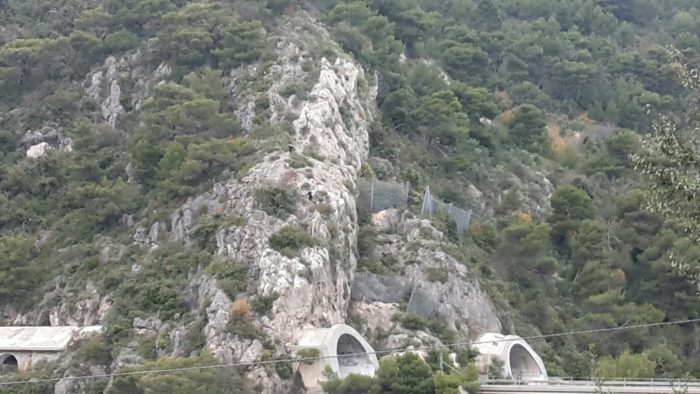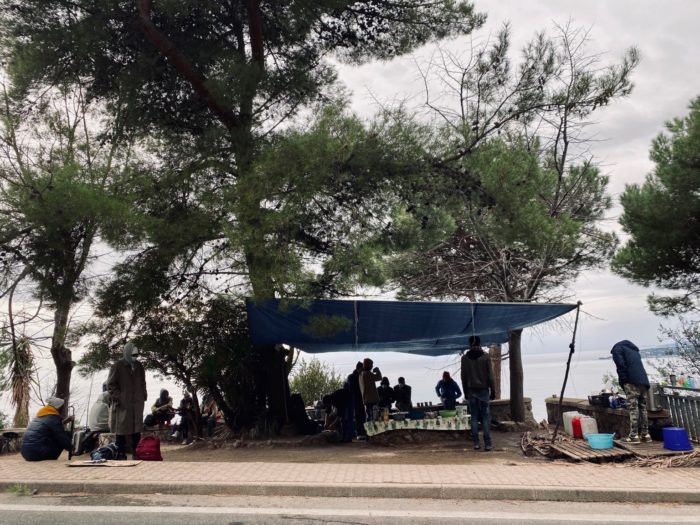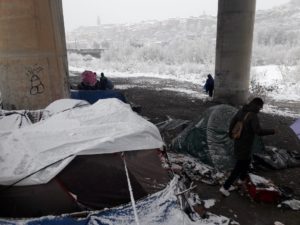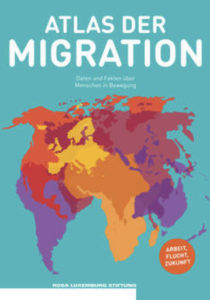
Von unseren Freund:innen der Kesha Niya-Kitchen,
17. Dezember 2020
This is the situation at the border between Italy and France, where hundreds of people are hindered to cross the border and are left alone without basic care or visibility, furthermore welcomed with the violation of their right to move freely, regular violence by police officers and prejudices of the local habitants. All of this is happening for 5 years now – this is an update on the situation and our work shortly before Christmas 2020, during a Corona pandemic that doesn’t stop in front of vulnerable people on the streets. You are very welcome to share!
It is offical now: The procedure which french police has been following during the last years has been declared illegal.
Since migration flows started to go trough Italy to France, the usual way to reject people by means of the French border police was to stop them from entering France, take them on the french side in trains, in the mountains or on the streets of the cities until 30 km after the border (Menton, Monaco, Nice,…) Then they are put in a „container“ over night or for several hours during the day and finally sent back to Italy with the „refus d’entrée“ (a paper just saying that entry is denied to this person). The Conseil d’Etat, the highest court in France, now decided on the 27th of november that this in fact is not following european laws, as the concerned border is an internal border of the Schengen countries, not external. This means that preventing people from crossing through this procedure (handing out a refus d’entrée without any further communication or the possibility to ask for asylum) has no legal ground, and never had. Since this day, we expected changes to appear in the way state forces are working and reacting – they did not. We started to collect photos of the „refus d’entrée“ that people got since the court decided over the illegal status of these documents. They have not decreased or changed, and neither has the controls of people on their way. We are keeping track of this treatment, so that there will be proves for a legal action against the french border police in the future.
If there will be consequences based on the court decision we will let you know. (https://www.conseil-etat.fr/…/arianeweb/CE/decision/…/428178)
And this is official now, too, concerning the activities of the french border police in this area: The denial of french and european rights which people should have in the „containers“ (places to hold detained people at the french police station at the border) has been sanctioned.
Everybody who is coming to our working spot at the border has been held for several hours during the day or the whole night (times ranging up to 24 hours, while it must not be more than 4 hours officially). The access to services they have the right to is ignored: food, drinks, medical care, toilets, translation, contact to their families and more. The containers are made out of metal and stone and have outside temperature.
Two french organisations, Anafe (legal support) and Medecins du monde (medical support), have been fighting to be allowed to enter the station. So far, this was denied. Now, on the 30th of november, the administrative court of Nice sanctioned this refusal by the prefecture of Nice. The prefecture has now 30 days to re-evaluate the allowance. In the past, there have been changes to hinder external people from entering, like declaring the container a „safe space“. We hope, Médécins du Monde and Anafé will be allowed to enter in the future and monitor the situation inside. We will give you an update in the beginning of January (http://www.anafe.org/spip.php?article584)
Both decisions empowered us in our work. There is legal ground now against the things that we are fighting, and it creates the possibility to make injustice, violation and violence more public and not just anonymous suffering. Of course, the one thing we learned here is the huge gap between theory and the practical methods.
In theory, the decision by the Conseil d’Etat would mean that our group is not needed anymore and people should be able to cross the border and have a safer passage because their rights are respected. In practical aspects, this is not the case.

Officially, the french border police PAF is not allowed to do what they do.
They are not allowed to hold people for longer than 4 hours and are actually responsible by law to give food, water, medical aid when people are asking for it, the possibility to have a translation of every communication and any document they get, the possibility to contact a lawyer, the possibility to contact their relatives. Every single right of those is violated.
But most of all, the european legal right to ask for asylum in a country the person arrived at is violated for every single person. People without documents (means a valid passport / permission to stay plus home country passport) do by law have the right to be informed about what is happening to them, why a police control is taking place, and to declare that they want to ask for asylum in France. Then, police would have to follow a procedure to contact an office of asylum and set up an appointment or a Skype talk for the person so that they can declare their asylum request.
They have any other right than being deliberated for as long as 10 – 30 hours in an empty container with a stone floor.
„They treat us like animals.“ We could not count how many times we heard this phrase.
Who explains the european and french laws to the french police and authorities?
We continue our work with the knowledge that slowly the humanitarian situation has to change and does, even if it is just the theory starting in this one case. If it is injustice, at least call it injustice. We will stay alert in the next time how we can support the action following this to take place, like keeping the refus d’entree handed out to people and continuing to take testimonies of what is happening in the „containers“ of the french police station. Further down the article you can find in detail reports on the violent incidents these weeks.
In general, we have seen a lot of new arrivals from other places in Italy. The evening food distribution in Ventimiglia, which is covered by other groups besides our day once a week, has seen between 200 and 260 people! The highest numbers that have been count this year and similarly, high numbers at our working place at the border.
A lot of eyes are on Ventimiglia at the moment. For the first time since 2016, everybody who is stuck in Ventimiglia is facing a winter without accommodation, safe space, available food and medical help. Since the Red Cross Camp closed down in summer and has never been replaced, and as the mayor is not interested in creating such a space again, it is a precarious situation. Used sleeping possibilities in the Ventimiglia area are the sides of the road (hidden in bushes), the beach, space under bridges and empty houses. Naturally, small fires are made to get through the night at the beach, and rests of the wood brought by the storm are used. The fires are also necessary to dry clothes, as we have seen many rainy days. On three days in the last week, we managed to have a tour through Ventimiglia to check up on the situation of everybody living outside, talked a lot, gave some foods, drinks, coffee, tea, hygienic articles and especially took care of families / women on the streets by proposing to find accommodation. This tour gave a new perspective on Ventimiglia, as we were not just meeting people on the move but could also reach a lot that we may have met one time at the border and that are stuck in the city before trying again, as well as we could talk to people who just arrived at the train station to share information about support points in Ventimiglia (like the Caritas house and the food distribution).
Additionally, we are closer to the way police and other state forces are working in the city. This included random controls of exclusively non-european-looking persons. We also saw (for the first time) French police officers at the train station in front of trains in Ventimiglia. We don’t know the reasons for that yet. The French and Italian government declared to have a collective border unit in the future to enforce border controls and arrests.
During the last couple of weeks, members of Human Rights Watch, Medecins du monde, Amnesty International and grassroot organisations from other cities were visiting Ventimiglia to have an idea about the situation. Everybody agreed on the importance to improve life here. We will try to improve on networks to ensure things that are needed in places where they are needed, which is in Italy especially Ventimiglia at the moment.
Still, there is no accommodation planned or a perspective for the near future, for as many people as there are. The only (always full) place is a family / women house organised by several associations of the region, where 15 persons can stay each night.
This is a huge help, but not enough at all. Also private hosting possibilities over night are at the edge and always used as best as we can.
Depending on our donations, we started bringing clothes to our „breakfast“ at the border, and it can not be too much at the moment. Everything is gone really fast as people are left with wet clothes from the rainy days or are not well equiped for winter. On the bottom of the article, you’ll find a list of things that are always needed and we would be happy receiving from you!
We continued our main work as usual, the „breakfast“ from 9 a.m. to 8 p.m every day, one kilometer away from the border in direction Ventimiglia on the italian side. We are working in this small empty space now since summer and have been in another place (which was closed due to neighbours) since 2018.
Everybody who is released from the french police station onto the italian side has to take the road to Ventimiglia, to where they were coming from, taking the train or walking through the mountains (the unsafe „passo della morte“). Naturally, coming back to Italy, they find our „breakfast spot“ on the side of the road. We create access to food, drinks, hygienic articles, a small stock of clothes, medical first aid, a roof to protect from the rain. More importantly, it is a more peaceful place than the place they are coming from, we have talks and can share the general knowledge we have on the Ventimiglia area and some answers on struggles.
We are helping with legal advice or redirecting to legal counselors for specific cases. Minors who have a prove of their age and a refus d’entrée have a right to not be denied in France and we can follow a procedure with a lawyer to get them back to the police and able to cross the border without being taken and pushed back. We see people with a running asylum process in France being pushed „back“ as they are controlled based on racial profiling by the police and detained because one document was missing or they didn’t have it with them. For both cases, it is usual for the police to change details (like the minor’s date of birth on the refus d’entrée to make them older and push them back as „adults“) or take documents from people and destroy them in front of them, especially when people want to communicate with them, explain their situation and know which rights they have.
Following, our (quite accurate) numbers of people we counted at our « breakfast » between 9 a.m. and 8 p.m. :
Between the 27th of november and 2nd december :
610 people in total, of those 510 pushbacks from the police station and 100 coming from Ventimiglia or the area around.
Of those:
– 41 women
– 15 accompanied children
– 21 unaccompanied minors
Between the 3d and 9th of december :
741 people in total, of those 615 pusbacks and 126 coming from elsewhere.
Of those:
– 65 women
– 27 accompanied children
– 17 unaccompanied minors
Please bear in mind that we mostly meet people that we see several days in a row, as it takes between around 2 to 6 attempts to cross the border to France. So the actual number of individuals is definitely lower.
These are the concrete incidents in contact with police that people decided to share with us or that we partially experienced:
27th nov : We go through a procedure with our voluntary lawyer to bring two minors to France (they had been illegaly pushed back) . Despite having the necessary documents to prove that the pushbacks were illegal, the french police says that “it is not enough ». The same boys report that they were taking a truck in the night before to get the France, but were arrested on the highway by italian police. At the police station, they are being told to lie down, and as one of them refuses, he is hold by 5 police officers and pushed to the ground. One is pulling him to the ground by holding and pulling his nose.
28th nov: We meet one man who has been taken and arrested at the french police station, though he is already an asylum seeker in France and was just visiting a friend in Italy. We accompany him back to the border and eventually he is allowed to go to France.
30th nov: One man who is already an asylum seeker in France is taken and arrested. He shows his documents to the french police officers, who destroy all of them. +
The day before, 4 men with italian documents who are regularly working in France are being controlled in Nice in their company´s bus. They are taken to the police station in Nice and kept until 2pm. They report very bad conditions, have their phones taken away from them and photos and fingerprints taken. The 30th of november, they are taken in handcuffs to the border and are eventually pushed back. Three of them did not have all of the necessary documents with them personally, while one should have been allowed with the right documents.
1st dec : At night, three women get lost in the mountains and scream for help during this time. Some men try to cross, are taken by french police, report about the women as they heard them screaming. They ask for help for them. The police refuses to take any action and say that it will be okay. Eventually we welcome the three women the next day at our spot, as they found the right path with daylight. +
One man is travelling from Italy to Marseille, France, as his father is sick and staying in a hospital there. He wants to visit him. The man has a valid Passport, valid permission to stay, the necessary Covid documents and documents that prove that his father is in the hospital, so he can be sure to travel during Corona. He has everything that he needs to cross legally, but is taken in a train on the french side and taken to the french police station. The french police destroy the documents that prove that his father is in the hospital. Eventually, he is pushed back to Italy. We set him in contact with our lawyer.
3d: We meet around 7 minors in the afternoon. We have been in contact with one of these minors. He has already tried 2 times and now the third time, being arrested by police again, he was clearly asking for his right for asylum as a person of under 18, trying to communicate to the police. As a reaction, apparently they beat him very bad. No one of this group of minors talks about their stay in the police station. One of the minors who was cheerful, relaxed and cooking with us the day before is now serious and doesn´t want to talk. We can not say what happened. +
One minor has a wrong name on his refus d´entrée, additionally to a wrong date of birth given by the french police. Due to this, we can not help him with the usual procedure to get him back to France.
4th dec : The day before, 11 men travelling together take the mountain path at night. When they are stopped by french military, one of them is frightened and falls down the steep side of the path. His friends are very worried and ask the military to check if their friend is safe. The military tells them that they will check on it the next day. They call the french police so that the men will be taken to the police station. The 10 men are resisting on checking up if their friend is okay, the military takes a photo of the place where it happened and of all of them, besides that they don´t want to take any further action. When the police car arrives, the men refuse to get inside and to leave without their friend. They are put into the police car by force, taken into the station and have no further possibility to inform somebody or talk to someone at the police station. Eventually they are pushed back to Italy the 4th of december and arrive at our « breakfast » spot, still very worried. We get the name, contact and photo of the missing friend to look out for him. Some time later they receive the news that their friend is safe. He hurt his leg but could find a way back and received help by people at the beginning of the path.
Just two months ago, one men (who was with two others while walking the mountain path) went missing. His friends saw him fall really deep and tried to alarm police in the french police station after they were arrested. They were not taking action. Just the next day, italian forces went to the mountains, but as the italian path part is short and mostly safe, they told us after two days of search « We are trying our best, but we think that we are searching in the wrong place. » Basically, if people have accidents, it is on the french side. In the cases that we saw, nobody was taking responsibility for the possible death of someone, not even trying to react in some way – the path is narrow, not stable or solid, and a lot of people take it at night without light. What does dying here mean? That nobody will ever know about it, mostly. If you are travelling alone or walking with people who barely know you, if the ones who could secure or safe you don´t show up and you go missing, you die anonymously. It is the same kind of invisibility that people experience through violence at the police station and in trains, where nobody is watching, and in places in the city where they find a spare space to sleep. They don´t really exist in public life. Until today, as far as we know, they never (searched and) found the body of the missing man from two months ago.
6th dec : Personal belongings of a man are stolen (we had communication problems with him and could not know more).
8th dec : We meet a pregnant woman and her aunt who left an italian camp because of bad living conditions, eg. they didnt get any food there. They were expulsed from the train here at the border by french police using tear gas (?) against them.
Later, another man tells us more about the incident: He had been in the train with several other people. French police entered the train in a city after the border. In a toilet, one pregnant woman and her two year old daughter, another woman, the reporting man and more people were hiding. Police commanded to open the door, but according to the man the door was blocked from outside. The police broke the door and used strong tear gas (?) against them. The man insisted on the fact that it was some sort of acid, not just „normal“ tear gas and extremely painfull. The gas was put in the small toilet room without that anybody had the possibility to leave. This counts as well for the unborn baby, the small girl and their mother. The reporting man was shouting at the police officer: „You are not allowed to do that. You know that you are not allowed to. You can get charged for that.“ One Italian Police officer answered by saying that he doesn’t speak english. Later, at the police station, the exact same officer was having a fluently spoken interview with the reporting man (personal information for the refus d’entrée). In english. Until this point in the police station, the man could not see because of the tear gas (?) / Acid, was coughing and had pain as the other people.
He was asking for medical care and got the answer to look for medical help in Italy after his push back. He got some drops of a liquid for his eyes. As we found a private hosting possibility, we could follow up on the man’s situation. He still had this tear gas (?) On his body and in his hair while showering and had problems breathing and coughing until the next day.
If you continued to read our article until now, we thank you for following the situation here at the french italian border. Although the struggle is ongoing, we keep our rage and our will to never lose sight of the people on their way through Europe.
You are always welcome to join us and live with us if you can commit to a time span of at least two weeks, or to give support through donations.
Things that we will constantly need in the next time: hats, gloves, socks, scarfs, other clothes (contact for more details), tooth brushes and paste, old phones, sim cards that can be used in Europe (Leika for example), and fresh food donations (directly at the border if you live close).
You are welcome to contact us and use these contact details, we will try to come back to you as fast as we can!
Sending lots of warmth – the Kesha Niya Team
www.facebook.com/KeshaNiyaProject
https://keshaniya.org/
kesha-niya@riseup.net
keshaniyakitchen@gmail.com
https://www.paypal.com/paypalme/keshaniya
Bank account: GLS Bank
Depositor: Frederik Bösing
IBAN: DE32 4306 0967 2072 1059 00
BIC-Code: GENODEM1GLS












![Für Buchvorstellung: Mail an nobordernoproblem[ät]posteo.de](https://nobordernoproblem.org/wp-content/uploads/2019/08/973F2C08-EDDC-44A4-A4E2-19FE4CEFF44D-700x1130.jpeg)






